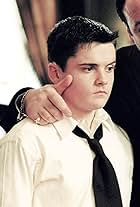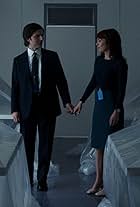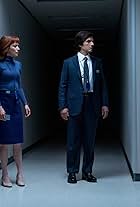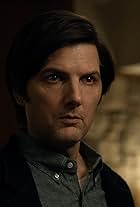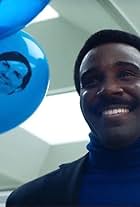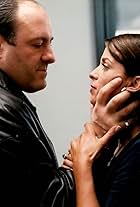
Pjtaylor-96-138044
Joined Jul 2011
Welcome to the new profile
We're still working on updating some profile features. To see the badges, ratings breakdowns, and polls for this profile, please go to the previous version.
Ratings6K
Pjtaylor-96-138044's rating
Reviews2.9K
Pjtaylor-96-138044's rating
'Flesh + Steel: The Making Of 'RoboCop' (2001)', a play on words of director Paul Verhoeven's earlier 'Flesh+Blood (1985)', offers a behind-the-scenes insight into the making of 'RoboCop (1987)'. Presented as a talking-head documentary, this featurette - available on certain home-video releases of its subject - includes some interesting stories and a handful of on-set clips and images. With interviews from Verhoeven, writers Edward Neumeier and Michael Miner, executive producer Jon Davison, production designer William Sandell, cinematographer Jost Vacano, stop-motion animator Phil Tippett, visual effects artist Craig Hayes, composer Basil Poledouris, and even so-called "RoboCop Expert" Paul Sammon, the piece touches on various aspects of the picture's tumultuous development process. With mention of most key actors, including Peter Weller and Nancy Allen, and an honest look at the harsh realities of production, the affair feels like an honest retrospective that provides plenty of unique insight into the real-life struggles behind its iconic focus. It sounds like a pretty tense time that nobody really enjoyed, but at least it resulted in a classic movie that has stood the test of time. Verhoeven, in particular, is an interesting interviewee, his no-filter approach providing plenty of insight into his distinct thought process and his concept of RoboCop being an "American Jesus". Although the short isn't as in-depth as it could have been, it acts as a nice companion to the main event and feels relatively fulfilling as far as behind-the-scenes retrospectives go. It certainly isn't a full meal all of its own, but it's a suitable side dish that may just make you appreciate the main course that bit more. For what it is, it's pretty good.
'The Surfer (2024)' is an incredibly frustrating and unpleasant experience filled with sun-baked surrealism, intolerable cruelty and men doing anything to avoid going to therapy. This bizarre little thriller starts out as if it's going to become a typical revenge actioner, but soon transitions into all-out horror territory as our determined hero constantly clashes with the unreasonable locals of his soon-to-be-local beach. All he wants to do is surf like he used to as a boy, but he soon begins to lose everything he has in his quest to recreate the peace of his youth. The film really nails the feeling of slowly losing your sanity, and your self, in the brain-melting heat of the Australian sun, slowly becoming more and more claustrophobic as we find ourselves further entrenched in the slowly snapping psyche of our put-upon protagonist. At once desperate for him to cut his losses and hopeful for him to get the upper hand, we unwillingly follow Nic Cage's character down the rabbit hole until he - and we -start to doubt everything around him. What's initially a simple premise soon gives way to a total nightmare scenario that really gets under your skin, getting worse and worse with each passing poor decision or act of malice. Although things take a bit of an unexpected - and arguably less interesting than promised - turn towards the finale, the flick's immersive unhinged atmosphere remains remarkably cohesive for its entirety. It's merciless, constantly keeping you off balance and never quite doing what you expect it to. As such, even when it's at its least successful, it's still interesting and engaging. It's very well made, with saturated cinematography and confident direction that never settles for an easy or anticipated shot. You can practically feel the heat pouring out of the screen, the sweat forming on your brow as you buckle in for another extreme close-up or hallucinatory flourish. Technically, it's almost perfect, which makes up for most of its narrative missteps and thematic uncertainties. It's a surprisingly strange experience that keeps you on the edge of your seat and gritting your teeth. It isn't nice, but it's undeniably effective. It's a strong effort.
Unlike most of Marvel's recent output, 'Thunderbolts* (2025)' isn't just "not bad", "perfectly fine" or "better than people say it is", it's genuinely good. It's a movie that feels like a real movie, with real sets and costumes and characters and a story that doesn't seem like it's been subject to a million rewrites. It isn't based solely around gratuitous cameos or smothering links to promised sequels and forgotten prequels. It's actually about something, with themes and messages and characters who change and grow over time. It understands that spectacle should be driven by character, that a team's dynamic should shift and strengthen over time, that comedy shouldn't undercut drama, that stakes should be personal as well as world-ending, that set-pieces are more effective if they aren't focused around wave after wave of nameless thugs or CGI beams in the sky. It stumbles on occasion, it falls into some of the same pitfalls as its peers, its development is a tiny bit rushed and often spelled out for the least engaged in the crowd, but its successes are more important - and more impactful - than its failures. This is an entertaining, engaging and emotionally affecting experience that thrills, chills, tickles and delights. It's surprisingly dark at times without feeling edgy, and its sentimental subtext is presented sincerely enough to warm the heart without feeling mawkish. It's funny, but it never sacrifices its more serious elements; its tone is shockingly well balanced. Its performances are all pretty much spot on (especially those of Florence Pugh, Lewis Pullman and David Harbour), and its characters are actually quite interesting because they're notably different to their more traditionally heroic counterparts (some of them, for example, are jerks). Its themes of redemption ring true because of where these people end up compared to where they begin. The film believes in second chances and it doesn't take shortcuts with them. While the cinematography is a little dull overall, the picture has a distinct and tonally congruous aesthetic that's tangible and considered. It manages to blend the real with the imagined in a tactile way, naturally escalating from boots-on-the-ground semi-realism into all-out no-rules fantasy without betraying its core identity. Its CG elements aren't especially prevalent, but they're still suitably convincing. Although it's potentially lighter on action than you'd expect, the set-pieces are still really compelling and have a grounded vibe that makes them punchy and effective. There's some well-shot and well-choreographed hand-to-hand combat, which mostly makes good use of the (slightly) varying power sets of its fighters (Ghost has the most visually and conceptually interesting skill) and often makes unexpected yet satisfying choices - such as when a hallway fight is captured mostly with a single overhead shot that tracks Yelena as she casually takes on several armed foes simultaneously. There's also some more surrealist elements in the third act that escalate things without making them so far-fetched as to feel unrealistic within the established world. The not-exactly literal approach of the finale is really effective at communicating internal conflict externally, marrying character-focused introspection with expected superhero spectacle in a really engaging and exciting way. I love that the climax doesn't just come down to seeing who can punch the hardest, and the flick does an excellent job at conveying why this disparate bunch of anti-heroes are the perfect people to save the day this time (even after it spends a long time communicating that, at least on paper, they aren't "save the day" material). One disappointing sequence occurs within moments of the darker-than-usual Marvel Studios logo: Yelena sits atop the second-tallest building in the world, then leaps off and parachutes to a neighboring skyscraper. In and of itself, it's a nice moment. That disappointing thing about it is that it's shot in such a way that it isn't obvious, at all, that Florence Pugh actually performed the stunt herself. It's not just that we don't get any close-ups of her operating the parachute, which - to be fair - she might not have done herself, or that the stunt is so brief that it's over almost as soon as it begins, but rather that the shot of Pugh jumping off the building is too close to confidently see that she fell more than a few feet below frame. Ideally, the camera ought to have started close, then pulled back so we see her falling a long way before she slips out of frame and the rest of the stunt-doubled stuff can occur in a wide-shot. It's a small gripe but it occurs so close to the start that it took me a while to process it before I could settle back into the affair (it doesn't help that the piece starts with clunky narration telling us the internal struggle of our hero, which soon becomes apparent regardless). Another weakness is the way the film treats one of its deaths. If you've seen the movie you'll know exactly which one I'm talking about. I get that it's meant to increase the stakes by proving nobody is untouchable this time, but it's done so early and with so little consequence or reaction that it feels nonchalant rather than brave or distressing. It's blunt but not all that shocking, and I feel as though it should have been reserved for later when we've had some time to get to know the character in question - so would undeniably care more about their demise - and when it could be used to genuinely raise the stakes by proving just how out-of-depth the eponymous team is at the start of the final third. It kind of feels like Marvel didn't know what to do with the character and weren't comfortable having them roaming around somewhere in their off-screen universe, so decided just to unceremoniously kill them off as soon as possible. Still, it's not a major issue, more of an annoyance - or, more accurately, a missed opportunity. Another minor annoyance is the post-credits sting, which feels a lot more traditionally Marvel in the sense that it's a blatant advertisement for one of its upcoming projects. Event the pre-credits climax feels like an obligatory tie-in to the future, but it's less bothersome because it feels relatively earned within the actual narrative. There's just something really laboured about the studio's need to connect everything together, and the ending stands in stark contrast to the feature's refreshingly self-contained and cameo-less majority. It doesn't help that the marketing department have opted to go into full spoiler territory less than a week after the movie's release, proving that the studio is far more concerned with its individual pieces' place within a wider puzzle than it is in said pieces (a wider puzzle which, by the way, has yet to be properly defined). I could write a whole piece about how frustrating Marvel's insistence on spoiling their own material is, but I don't want to take my focus away from what's inarguably their best movie since 'Guardians Of The Galaxy Vol. 3 (2023)'. Thankfully, it doesn't directly impact the success of this feature. This is a fun, tonally balanced, well-paced, exciting, relatively affecting and consistently entertaining experience that's a lot better than the "not bad", "perfectly fine", "better than people say it is" 'Captain America: Brave New World (2025)'. It feels like a proper movie, which ought to be a low bar but surprisingly isn't these days. It isn't phenomenal, but it's pretty great and it's a lot more enjoyable than I was anticipating. You don't need to use an asterisk when you call it a good movie, and that's really refreshing. It's a good effort that actually makes me excited to see these characters return in the future.








